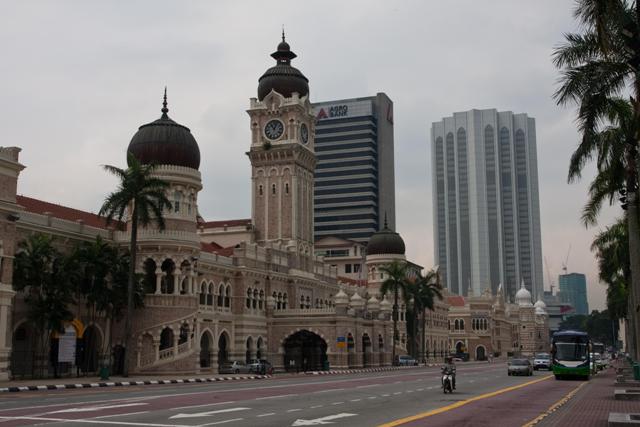 Malaysia's parliament building. [photo: Alamy]
Malaysia's parliament building. [photo: Alamy]
[This is an excerpt from an article in The Round Table: The Commonwealth Journal of International Affairs.]
Competition in policy, patronage and parochialism
Intercommunal moderation and political stability discussed in the last two sessions are tied back to the functions of political parties, the building blocks of coalitions. Downs famously argued that ‘parties formulate policies in order to win elections, rather than win elections in order to formulate policies’. However, as vehicles to win elective public offices, parties compete not just on policies but also patronage. In divided societies, interparty competition is also the arena for parochialism, where champions of rival communities try to assert dominance over or show defiance against each other.
The complex and fluid evolution of coalition politics in Malaysia is then the result of changing opportunity and incentive structures. Notably, pursuit of policies and dispensation of patronage are substitutes for parties in courting voters, even in parochialist identity politics. With ample access to patronage resources, government parties can afford to be moderate if they choose to. In contrast, opposition parties may need to be radical in programmatic positioning to court voters to whom they cannot offer largesse. The pre-1990 ethnic flanking competition by both Malay and non-Malay opposition parties against the Alliance/BN might be caused by not just the latter’s monopoly of the middle ground in programmatic positioning as argued by Horowitz but also its monopoly of patronage and policy-making power. The Opposition parties’ inability to effect changes in policy-making and law-making, on the one hand, and to dispense patronage, on the other, also explains why the losers in two-coalition competition–GR-APU, BA, PR and BN – were unsustainable. Conversely, with access to executive power or the prospect of controlling it, the ethnic flank parties – both DAP and PAS – significantly mellowed their stands on identity issues. PAS deputy president Tuan Ibrahim Tuan Man candidly admitted that its push for Hudud was made when it was in Opposition but that a continued pursuit when in government would backfire.
Malaysia: The 15th general election and its implications – Special edition
Introduction: Hung parliament, coalition government and the rise of the Islamists – Malaysia after the 2022 election
Voting behaviour after the collapse of a dominant party regime in Malaysia: ethno-religious backlash or economic grievances?
The post-2020 fragmentation has reduced the uneven distribution of policy-making power and patronage between the government and opposition parties. Opposition lawmakers were once denied any constituency development funds (CDFs) – used for public works and welfare – by both federal and state governments in the calculation that Opposition supporters might switch to voting for government parties to gain access to those funds. In December 2020, Perak became the first state to give all state lawmakers’ equitable allocation. All PH parliamentarians were given an equal amount in constituency allocation under the CSA signed by the Ismail Government and PH. Now, PN parliamentarians are demanding the same. In January 2023, PN further announced a shadow cabinet line-up to signal a more serious attempt to compete on policy, but the Anwar Government has yet to recognise it.
Conclusion
The hung parliament and coalition government produced by GE15 underline the evolution of coalition politics in Malaysia, especially since 2018 when the multiethnic two-coalition competition was first replaced by a toxic multiethnic-monoethnic binary competition. The permanent coalition of Alliance in Malaysia’s early years was misclassified as ‘consociationalism’ even though it failed to improve government–opposition relations between elections. On the other hand, the three coalition governments since 2020 resemble ‘shifting coalitions’ in Dutch and Belgian consociationalism, even though the government–opposition relation is anything but consociational. While party-hopping is now seemingly curbed even in Sabah, political instability may return if coalitions realign. The quest for interethnic moderation and political stability may require a reduction in uneven distribution of policy-making power and patronage between government and opposition parties, and the 2021 political truce between the Ismail Government and PH suggests a positive prospect.
Chin-Huat Wong is Professor and Deputy Head (Strategy), SDSN Asia Headquarters, Sunway University, Sunway, Malaysia.



